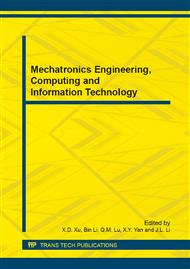p.4422
p.4435
p.4439
p.4443
p.4447
p.4453
p.4457
p.4461
p.4465
Early Warning Model and Simulation of Network Cognition Based on Sampling Sequence of Sine Function
Abstract:
Under the background of a great boom in contemporary culture, network culture has rapidly developed into a form of manifestation. Groups of college students as the most active use of network source also makes the network culture gradually permeate the campus, which has made a great influence on moral cognition of college students. Based on the background of current large network culture, this paper firstly analyzes the situation of network utilization by college students. Then we find that the construction of early warning model of moral cognition for college students is imminent. And we construct the early warning model of moral cognition by using the algorithm of sine function model. In order to verify the practicability of the model, we use the interactive multi-model simulation analysis, and the results indicate that the model has a strong practicality, and has a very good controllability, which has a positive role in promoting the education of moral cognition for college students.
Info:
Periodical:
Pages:
4447-4452
Citation:
Online since:
May 2014
Authors:
Price:
Сopyright:
© 2014 Trans Tech Publications Ltd. All Rights Reserved
Share:
Citation:


